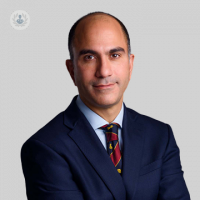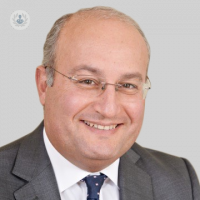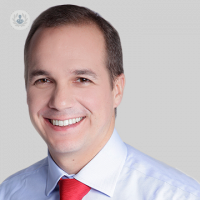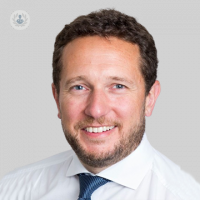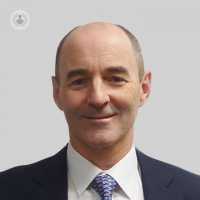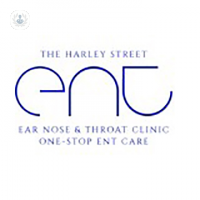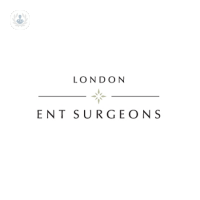What is tinnitus?
Tinnitus refers to the hearing of noises that are not caused by an external source. Often heard has a ringing or buzzing sound, these may be heard temporarily or chronically. Often, these noises are accentuated when there is absolute silence. Tinnitus is not a condition in itself, but a symptom of an underlying condition.
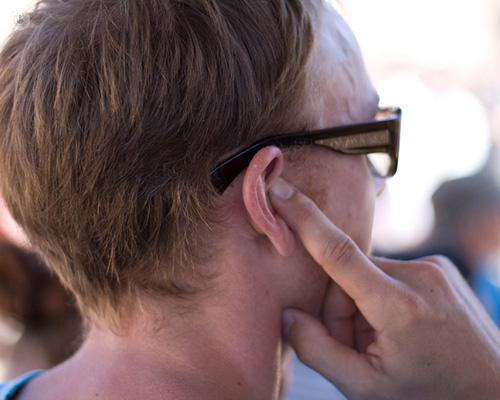
What are the symptoms of tinnitus?
In addition to hearing the buzzing, ringing sounds, tinnitus can cause difficulty sleeping and concentrating. As a result, it can sometimes put a strain on someone’s psychological wellbeing and personal relationships, particularly if it is chronic.
What causes tinnitus?
Tinnitus is not a disease, but a symptom of other ear pathologies, such as hearing loss. Therefore, the causes that can trigger it are multiple. Common causes include:
- Hearing loss
- Exposure to loud noises
- Blockages (from a build-up of earwax)
- Meniere’s disease
- TMJ disorders
- Head or neck injuries
- Certain medications (e.g. antibiotics, aspirin and certain antidepressants)
- High blood pressure and circulatory problems
Can tinnitus be prevented?
To prevent tinnitus, it is best to keep the ear clean and free of wax. It is also important to avoid caffeine, smoking, alcohol and excessive salt intake. It is also important to avoid noisy environments. People with cardiovascular problems are at a higher risk of developing tinnitus, so ensuring you maintain a healthy blood pressure and eat a healthy diet are important.
What is the treatment for tinnitus?
Treatment will depend on the underlying cause and treating this is the first step. Often this will involve either removing excessive earwax, changing your medications for other conditions or treating a blood vessel problem.
If these do not help, then there are other therapies that can help you overcome the irritation caused by the tinnitus. For example, noise suppression training involves using special devices to suppress noise, such as white noise machines, tinnitus retraining devices or masking devices.
In addition, managing stress, and removing irritants like alcohol, caffeine and cigarettes can help too.
11-13-2012 04-24-2024Tinnitus
Mr Vikram Dhar - Otolaryngology / ENT
Created on: 11-13-2012
Updated on: 04-24-2024
Edited by: Sophie Kennedy
What is tinnitus?
Tinnitus refers to the hearing of noises that are not caused by an external source. Often heard has a ringing or buzzing sound, these may be heard temporarily or chronically. Often, these noises are accentuated when there is absolute silence. Tinnitus is not a condition in itself, but a symptom of an underlying condition.

What are the symptoms of tinnitus?
In addition to hearing the buzzing, ringing sounds, tinnitus can cause difficulty sleeping and concentrating. As a result, it can sometimes put a strain on someone’s psychological wellbeing and personal relationships, particularly if it is chronic.
What causes tinnitus?
Tinnitus is not a disease, but a symptom of other ear pathologies, such as hearing loss. Therefore, the causes that can trigger it are multiple. Common causes include:
- Hearing loss
- Exposure to loud noises
- Blockages (from a build-up of earwax)
- Meniere’s disease
- TMJ disorders
- Head or neck injuries
- Certain medications (e.g. antibiotics, aspirin and certain antidepressants)
- High blood pressure and circulatory problems
Can tinnitus be prevented?
To prevent tinnitus, it is best to keep the ear clean and free of wax. It is also important to avoid caffeine, smoking, alcohol and excessive salt intake. It is also important to avoid noisy environments. People with cardiovascular problems are at a higher risk of developing tinnitus, so ensuring you maintain a healthy blood pressure and eat a healthy diet are important.
What is the treatment for tinnitus?
Treatment will depend on the underlying cause and treating this is the first step. Often this will involve either removing excessive earwax, changing your medications for other conditions or treating a blood vessel problem.
If these do not help, then there are other therapies that can help you overcome the irritation caused by the tinnitus. For example, noise suppression training involves using special devices to suppress noise, such as white noise machines, tinnitus retraining devices or masking devices.
In addition, managing stress, and removing irritants like alcohol, caffeine and cigarettes can help too.


Silencing middle ear myoclonus (Part one)
By Professor Manohar Bance
2024-11-21
What can be done to resolve middle ear myoclonus (MEM)? Professor Manohar Bance, one of the UK's leading otologists, expertly answers this question in an informative guide to a condition that can become so severe it ruins a night's sleep. See more


Managing the stress - tinnitus/tinnitus - stress cycle
By Professor Mahmood Bhutta
2024-11-21
Tinnitus isn't necessarily the damaged caused, it's when it's triggered long after that occurred. And that trigger can be stress. Then, of course, tinnitus can lead to stress. So, a frustrating cyclical issue can arise. Leading ENT specialist Professor Mahmood Bhutta tells us all about the tinnitus - stress/stress - tinnitus cycle, and what's involved in managing it in this informative article. See more
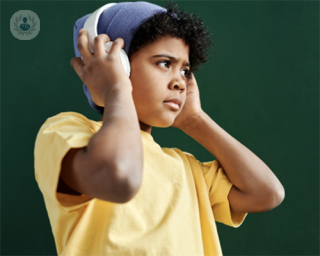

Tinnitus in children: is it common?
By Mr Angus Waddell
2024-11-20
While tinnitus is often experienced by adults who are losing their hearing, it can also affect children. Mr Angus Waddell, an accomplished ENT surgeon, is here to give us further insight into the impact this condition can have on children who get it. See more


Flying and ear pain: how to have a comfortable flight
By Professor Owen Judd
2024-11-20
Do you live with tinnitus or another ear condition and wonder whether taking a flight will make your ears worse? We’ve asked one of our leading ENT surgeons Professor Owen Judd whether it’s okay to fly with tinnitus, grommets or a perforated ear drum. See more
Experts in Tinnitus
-
Mr Nicholas Eynon-Lewis
Otolaryngology / ENTExpert in:
- Blocked nose
- Vertigo
- Voice disorders
- Tinnitus
- Sinusitis
- Septorhinoplasty
-
Mr Anthony Aymat
Otolaryngology / ENTExpert in:
- Cholesteatoma
- Ear infection
- Tinnitus
- Vertigo
- Voice disorders
- Hearing loss
-
Mr Javier Moraleda
Otolaryngology / ENTExpert in:
- Vertigo
- Dizziness
- Hearing loss
- Tinnitus
- Ear wax plugs
- Middle ear surgery
-
Professor Simon Lloyd
Otolaryngology / ENTExpert in:
- Otology
- Perforation of the eardrum
- Cochlear Implants
- Acoustic neuroma
- Dizziness
- Tinnitus
-
Mr Michael Pringle
Otolaryngology / ENTExpert in:
- Middle ear surgery
- Deafness
- Tinnitus
- Cholesteatoma
- Paediatric ENT
- Tonsillitis
- See all

The Alexandra Hospital - part of Circle Health Group
The Alexandra Hospital - part of Circle Health Group
Mill Ln, Cheadle
No existe teléfono en el centro.
By using the telephone number provided by TOP DOCTORS, you automatically agree to let us use your phone number for statistical and commercial purposes. For further information, read our Privacy Policy
Top Doctors

The Harley Street ENT Clinic
The Harley Street ENT Clinic
109 Harley Street, London, W1G 6AN
No existe teléfono en el centro.
By using the telephone number provided by TOP DOCTORS, you automatically agree to let us use your phone number for statistical and commercial purposes. For further information, read our Privacy Policy
Top Doctors

London ENT Surgeons
London ENT Surgeons
10 Independents Road, SE3 9LF
No existe teléfono en el centro.
By using the telephone number provided by TOP DOCTORS, you automatically agree to let us use your phone number for statistical and commercial purposes. For further information, read our Privacy Policy
Top Doctors
-
The Alexandra Hospital - part of Circle Health Group
Mill Ln, Cheadle, CheadleExpert in:
- Hip
- Cardiology
- Shoulder and elbow
- Paediatrics
- Foot and ankle
- Knee
-
The Harley Street ENT Clinic
109 Harley Street, London, W1G 6AN, Central LondonExpert in:
- Blocked nose
- endoscopy
- Hearing Implants
- Ear infection
- Hearing loss
- Acid reflux
-
London ENT Surgeons
10 Independents Road, SE3 9LF, East LondonExpert in:
- Allergies nose and ears
- Plastic surgery, reconstructive and aesthetics
- Otology
- Otolaryngology
- Most viewed diseases, medical tests, and treatments
- Migraine
- Nutrition
- Minimal access surgery (keyhole surgery)
- Head and neck cancer
- Neck lump
- Tremor
- Seizures
- Parkinson's disease
- Anxiety
- Long Covid
